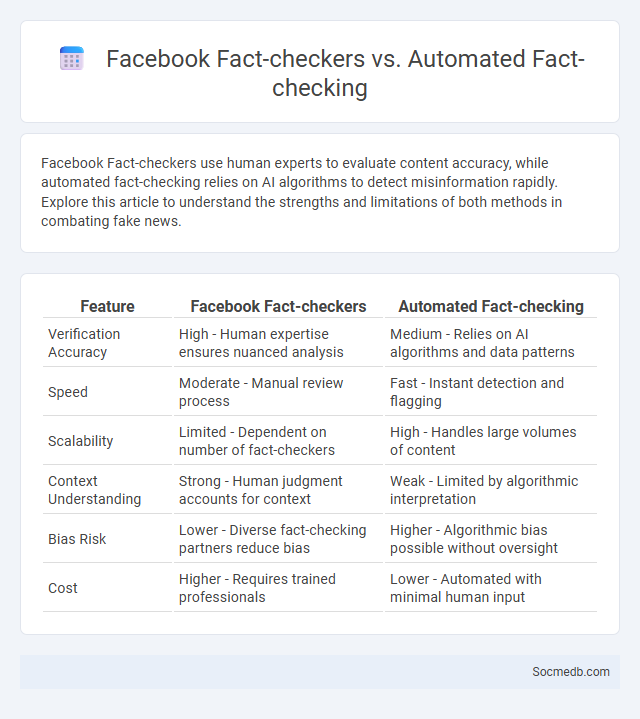
Photo illustration: Facebook Fact-checkers vs Automated Fact-checking
Facebook Fact-checkers use human experts to evaluate content accuracy, while automated fact-checking relies on AI algorithms to detect misinformation rapidly. Explore this article to understand the strengths and limitations of both methods in combating fake news.
Table of Comparison
| Feature | Facebook Fact-checkers | Automated Fact-checking |
|---|---|---|
| Verification Accuracy | High - Human expertise ensures nuanced analysis | Medium - Relies on AI algorithms and data patterns |
| Speed | Moderate - Manual review process | Fast - Instant detection and flagging |
| Scalability | Limited - Dependent on number of fact-checkers | High - Handles large volumes of content |
| Context Understanding | Strong - Human judgment accounts for context | Weak - Limited by algorithmic interpretation |
| Bias Risk | Lower - Diverse fact-checking partners reduce bias | Higher - Algorithmic bias possible without oversight |
| Cost | Higher - Requires trained professionals | Lower - Automated with minimal human input |
Introduction to Digital Fact-Checking Ecosystem
The digital fact-checking ecosystem comprises independent organizations, technology platforms, and AI tools dedicated to verifying the accuracy of online content across social media networks such as Facebook, Twitter, and Instagram. These entities employ techniques including cross-referencing with credible sources, machine learning algorithms for detecting misinformation patterns, and user crowdsourcing to flag potential falsehoods. Integrating fact-checking initiatives with social media algorithms enhances information integrity and mitigates the spread of false news to billions of global users.
Defining Human Facebook Fact-Checkers
Human Facebook fact-checkers play a crucial role in identifying and correcting misinformation by reviewing flagged content against credible sources. These experts rely on a deep understanding of cultural context, language nuances, and verified data to ensure accurate assessments. Their work enhances the platform's content integrity, reducing the spread of false information to billions of users worldwide.
How Automated Fact-Checking Tools Work
Automated fact-checking tools use natural language processing algorithms and machine learning models to analyze the content of social media posts for accuracy, cross-referencing claims against reliable databases and verified news sources. These tools detect misinformation by evaluating text patterns, flagging suspicious statements, and assigning credibility scores based on historical data and contextual relevance. By scanning large volumes of data in real time, automated systems enhance the efficiency of identifying false information, enabling quicker responses to viral misinformation on platforms like Twitter and Facebook.
What is Content Moderation on Facebook?
Content moderation on Facebook involves the systematic review and management of user-generated posts, comments, and media to enforce community standards and prevent harmful or inappropriate content. You benefit from this process as it helps maintain a safe and respectful environment by removing hate speech, misinformation, nudity, and spam, ensuring a positive user experience. Advanced algorithms combined with human moderators work together to identify and address violations promptly.
Key Differences Between Fact-Checking and Content Moderation
Fact-checking involves verifying the accuracy of information shared on social media platforms to combat misinformation and ensure that Your online environment remains trustworthy. Content moderation focuses on enforcing community guidelines by reviewing and removing harmful or inappropriate posts to maintain a safe and respectful digital space. Both processes are crucial but differ as fact-checking addresses truthfulness, while content moderation handles compliance with platform rules.
Strengths of Human Fact-Checkers
Human fact-checkers excel in evaluating social media content by applying critical thinking and contextual understanding beyond algorithmic capabilities. They identify nuances, sarcasm, and cultural references that automated systems often miss, ensuring higher accuracy in verifying information. Your interactions benefit from their ability to discern subtle misinformation, fostering a more reliable digital environment.
Advantages and Limitations of Automated Fact-Checking
Automated fact-checking on social media enhances content reliability by quickly identifying misinformation and reducing the spread of fake news across platforms like Twitter and Facebook. You gain faster access to verified information, promoting informed decision-making and healthier online discussions. However, limitations include algorithmic biases and difficulty in accurately interpreting context, which may lead to false positives or missed errors.
Challenges and Controversies in Facebook Moderation
Facebook moderation grapples with challenges such as balancing free speech with preventing harmful content, managing misinformation, and addressing biased enforcement. The platform faces controversies regarding transparency in policy application and inconsistent removal of hate speech or politically sensitive material. Your experience on Facebook can be affected by these moderation complexities, impacting how content is curated and shared.
Impact on Misinformation and User Experience
Social media platforms significantly influence the spread of misinformation by enabling rapid content sharing and amplifying unverified claims through algorithms designed for engagement. This proliferation of false information undermines trust in credible sources and complicates public discourse on critical issues. User experience often suffers as algorithms prioritize sensational or misleading content, creating echo chambers and reducing exposure to diverse perspectives.
The Future of Fact-Checking and Moderation on Facebook
Facebook's future of fact-checking and moderation will rely heavily on advanced artificial intelligence to detect misinformation with increased accuracy and efficiency. Your online experience will benefit from real-time content verification and automated removal of harmful posts, ensuring a safer and more reliable social media environment. Enhanced collaboration with independent fact-checkers and user-reporting mechanisms will further strengthen the platform's commitment to trustworthy information.
 socmedb.com
socmedb.com